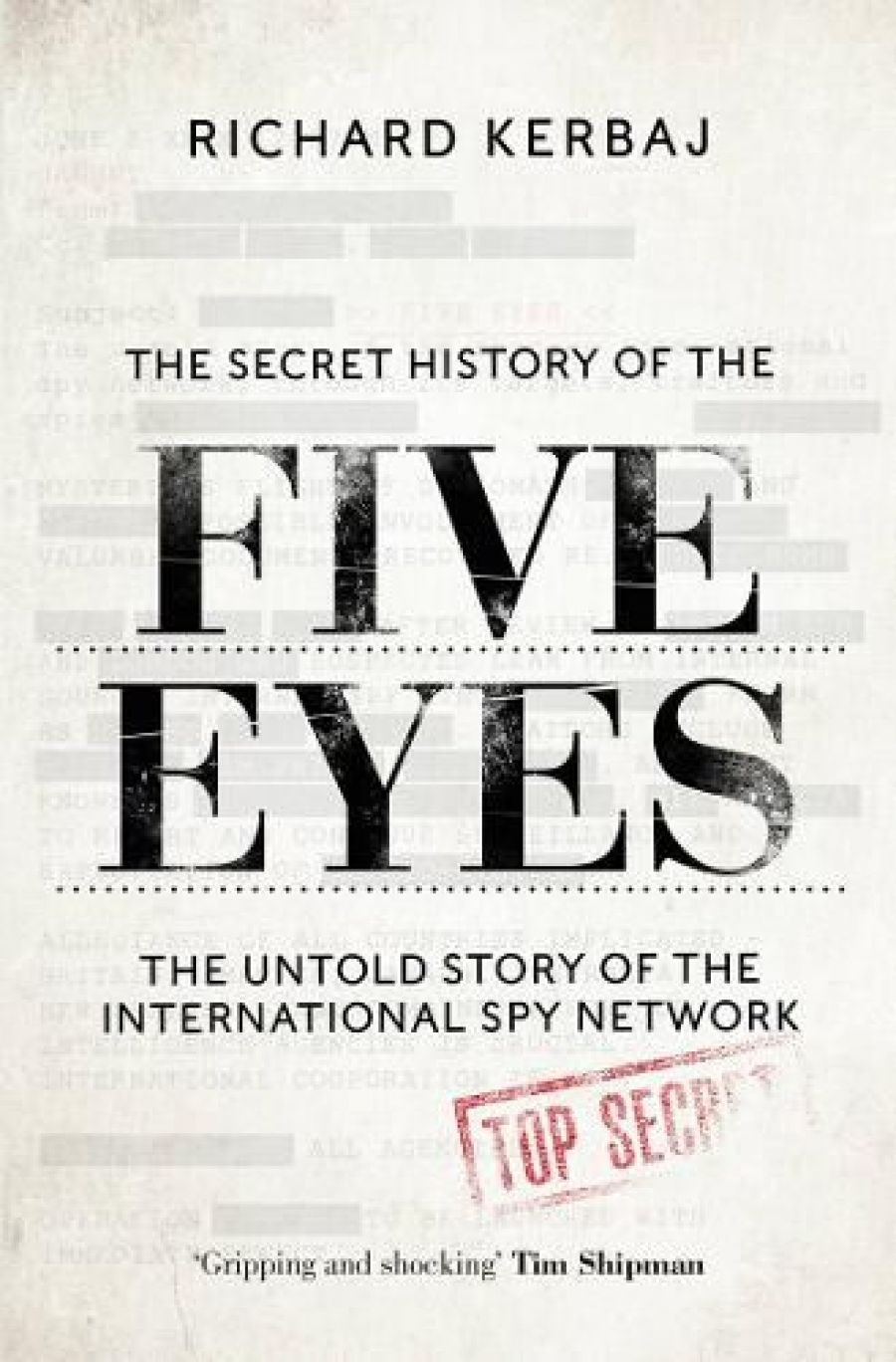
- Free Article: No
- Contents Category: History
- Review Article: Yes
- Article Title: Dodgy dossiers
- Article Subtitle: An engaging account of the Five Eyes
- Online Only: No
- Custom Highlight Text:
Richard Kerbaj is the latest in a long line of journalists and other writers to write a book on the intelligence agencies of the Five Eyes countries (the United States, the United Kingdom, Canada, Australia, and New Zealand). His major claim is that he has conducted interviews with more than a hundred current and former intelligence officers, as well as four former prime ministers, Britain’s Theresa May and David Cameron, and Australia’s Julia Gillard and Malcolm Turnbull. The willingness of so many intelligence officers to speak openly to a journalist, and in some cases to be identified by name, is a mark of how far the relationship between the agencies and external writers has come.
- Featured Image (400px * 250px):

- Alt Tag (Featured Image): Peter Edwards reviews 'The Secret History of the Five Eyes: The untold story of the international spy network' by Richard Kerbaj
- Book 1 Title: Five Eyes
- Book 1 Subtitle: The untold story of the international spy network
- Book 1 Biblio: Blink, $32.99 pb, 414 pp
Seeking to restore public trust in the agencies, while still protecting secrecy where it is essential, governments have adopted a number of measures. Some agencies have published official histories; agency heads have been more willing to speak publicly, and on the record, about what their colleagues do; and now, it seems, many intelligence officials are willing to speak to a relatively new and inexperienced journalist.
Now based in London, Richard Kerbaj started his career in journalism on The Australian. His former colleagues here have helped to promote this book. A magazine article has told of the ambition, energy, and flair for developing personal relationships that turned a Lebanese-born teenager with poor English working in a Melbourne milk bar into a leading Fleet Street journalist, an award-winning documentary maker, and now author of a book on intelligence and security. One of his several mentors has reportedly said that Kerbaj has not been ‘held back by the self-doubt that comes from knowing how much you don’t know’.
While there is much to admire in this backstory, it must be said that the title’s claims to tell ‘the secret history’ and ‘untold story’ of the Five Eyes relationship are largely hyperbole. The first parts of the book – on the World War II origins of the Anglo-American intelligence relationship known as UKUSA and its Cold War extension to include Canada, Australia, and New Zealand – cover territory that will be familiar to many readers. The existence and importance of the Five Eyes arrangement was well known long before it was publicly acknowledged in 2010.
Kerbaj adds a few nuances, by quoting from the diaries of Guy Liddell, an important figure in British intelligence, and sometimes by using a little-known individual as the hook on which to hang a chapter. This adds a personal dimension to episodes in the development of links between the British and American intelligence communities, where many of the major figures have already been the subject of numerous accounts.
The latter parts of the book, dealing with the impact on the intelligence agencies of counter-terrorism and counter-espionage in the twenty-first century, benefit more substantially from Kerbaj’s personal experience as a journalist on The Times and The Sunday Times in London, his role in producing documentaries on British-born jihadi terrorists and on the KGB’s poisoning of the Russian defector and former spy Alexander Litvinenko, and his interviews with current and former intelligence officials.
As might be expected, these officials for the most part defend the Five Eyes arrangements in general and their own involvement in particular. Access to them has clearly helped Kerbaj to conclude, after describing at length the ‘unaccountability and rogue practices’ of some agencies and the misuse of intelligence by political leaders such as Richard Nixon, George W. Bush, Tony Blair, and Donald Trump, that the Five Eyes network remains essential for the defence of liberal democracies.
Australian readers will gain some insights into the value and relevance of the Australian (and Canadian and New Zealand) contributions to the Five Eyes, as perceived from Washington and London. The foundation of ASIO and the 1954 Petrov Affair are covered in familiar detail, although Kerbaj does not seem to have caught up with the revelation, most recently described in Phillip Deery’s Spies and Sparrows (2022), that Evdokia Petrova was a more competent intelligence officer, and therefore a more significant defector, than her drunken, womanising husband. There is little on the other Australian agencies and nothing on, for example, the creation of the Office of National Assessments in the 1970s or its upgrading in 2018 to become the Office of National Intelligence, in part to match comparable developments in the other Five Eyes nations.
While Kerbaj deals at length with the enormous impact of Edward Snowden’s revelations in 2013, quoting extensively from interviews with successive heads of the British signals intelligence agency GCHQ, the book has only one passing reference to Wikileaks and does not mention Julian Assange by name. The Putin government’s grant of Russian citizenship to Snowden was announced when this book was in press.
In an interview that Kerbaj quotes at length, Malcolm Turnbull criticises, more vehemently than in his own memoir, A Bigger Picture (2020), Alexander Downer’s handling of a matter relating to alleged Russian meddling in the 2016 presidential election.
The book has clearly been produced at great speed, going to press in July and being published in October. Kerbaj is thus able to refer to the early months of the Russian invasion of Ukraine, although he does not mention that the American and British agencies took the highly unusual step of publicly revealing their knowledge of Putin’s preparations before he began his ‘special military operation’.
Kerbaj’s first book may not be ‘the untold story’ or ‘the secret history’ of the Five Eyes intelligence network, but it is an engaging and readable account of some of its major episodes.


Comments powered by CComment